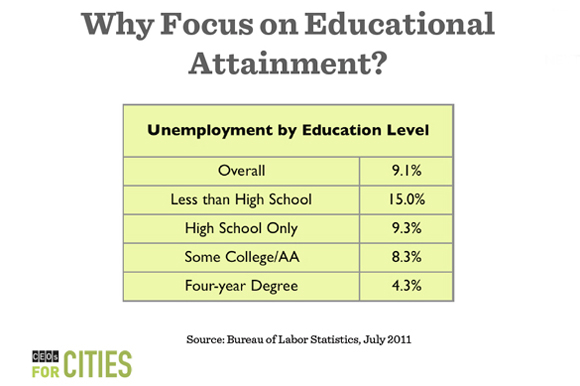Tampa Bay Competes For Talent Dividend, $1M
The Tampa Bay region is competing with 57 other U.S. cities/regions, including Pittsburgh, Memphis, Cincinnati and Oklahoma City, for a $1 million prize that will recognize success in attaining college degrees through the Talent Dividend.
What if the Tampa Bay region could attract a company that generates revenues of $3 billion or more? Think along the lines of megabank PNC or a sizzler of a tech company like Facebook.
Or think about this: by increasing the number of college graduates in Tampa Bay by 1 percent of our population, $3 billion would be generated in additional personal incomes, or revenue. Annually.
“The best way to measure the economic success of a city is per capita income and the simple most direct connection of per capita income is college attainment,” says Lee Fisher, president of CEOs for Cities, a civic lab and network of urban leaders across the country.
The Talent Dividend, an initiative out of CEOs for Cities, calculates how even a 1 percent increase in a city’s population of college graduates results in great economic boosts. In regional Northeast Ohio, it’s $2.8 billion. In Pittsburgh, more than $1.8 billion.
The more educated the city, the more robust its economy, reports Joe Cortwright, author of the study. The percentage of college graduates in a city’s population accounts for 58 percent of a city’s economic success, as measured by per capita income. From Austin to D.C., the most successful cities have the highest number of college grads.
If that’s not incentive enough to boost college attainment, here’s another. With the support of the Kresge Foundation, Lumina Foundation and DeVry Foundation, CEOs for Cities is offering a $1 million Talent Dividend prize to the city that produces the biggest increase per capita in college-degree earners in a three-year period. The prize will be used to launch a national promotional campaign focused on — what else? — talent development.
And while 57 cities-regions across the country — including Tampa Bay — are competing in the contest that launched in May 2011, that million dollar carrot is merely an incentive and rallying cry. The point, and the larger prize, is for each city to raise its college graduation rate.
The Tampa Bay Partnership is engaging all three major Tampa Bay metro areas (Tampa-St. Petersburg-Clearwater; Bradenton-Sarasota-Venice; and Lakeland-Winter Haven MSAs) to compete for the $1 million Talent Dividend Prize.
The Partnership’s initiative is being chaired by Hillsborough Community College President Ken Atwater. A formal rollout of the initiative is expected later in 2012.
Adding Up Successes
If Tampa Bay and other cities succeed, the entire nation wins. A better-educated workforce results in higher incomes and higher productivity and skills, contributing to the overall health of cities. But there’s even more at stake for society, as New York Times columnist David Brooks argues.
In writing about the polarization of our country, Brooks writes, “the crucial inequality is not between the top 1 percent and the bottom 99 percent. It’s between those with a college degree and those without.
“Over the past several decades,” he calculates, “the economic benefits of education have steadily risen. In 1979, the average college graduate made 38 percent more than the average high school graduate, according to Federal Reserve Chair Ben Bernanke. Now the average college graduate makes more than 75 percent more.”
In the 1970s, high school and college grads had very similar family structures, he continues. Today, college grads are much more likely to get married and be active in their communities, and much less likely to smoke, be obese or have a child out of wedlock.
The best thing we can do for our country, declared President Obama in a jobs report speech in October, is invest in ourselves and the best way to do that is to get more of our citizens graduated from college.
Increasing college attainment by 1 percentage point in each of the 51 largest metropolitan areas would be associated with an increase in personal income of $124 billion per year for the U.S., according to the Talent Dividend research.
A Matter Of Degrees
How many of us hold four-year degrees? Nationally it’s around 30 percent, while in Tampa Bay, it’s just over 25 percent.
Good magazine reports that while 60 percent of jobs today require at least a two-year college degree, only 40 percent of Americans attain a two- or four-year degree by the age of 27.
And another rather discouraging stat: Only 56 percent of college-goers earn a four-year degree within six years, making for a low on-time completion rate.
What can a city do? One place to start is with strategies from cities competing for the million-dollar prize.
In Memphis, they’re going after low-hanging fruit, conducting a series of back to school workshops for working adults with some college to complete their degrees, including financial guidance on how to pay for it. Leadership Memphis is involved as part of its mission to increase citizens’ IQs through learning or action and the Memphis Talent Dividend website invites citizens to donate, get involved and submit their own ideas on how to help — from even the smallest of gestures such as babysitting for someone attending class.
In Cincinnati, they’re incorporating Strive, a three-year-old “unified cradle to career vision” with corresponding goals for education improvements. With a major strategy already in place, it makes sense to coordinate existing resources and build on what works.
In Oklahoma City, Close the Deal brings mayors and CEOs into high schools to meet with seniors in a two-prong strategy: to tell them know how much it matters that they strive for a college degree and — a proven strategy — to urge them to complete free applications for federal student aid (FAFSA). It’s working. In schools they have visited, FAFSA apps are way up. That matters because of the 48 percent of graduating seniors who take the FAFSA form, 80 percent go to college, according to FAFSA.
In Pittsburgh, leaders are banking on more community support around the Pittsburgh Promise, a college scholarship program for qualified city students based on grade point average and attendance and worth up to $40,000 per student. (At a PromiseNet conference, Pittsburgh Promise Executive Director Saleem Ghabril was the one who compared the Talent Dividend to bringing in a company with revenues of $1.8 billion.)
Big Picture Strategies
To help cities in their quest for higher college graduation rates, CEOs for Cities and their partners are providing target audience information and big picture strategies on how to:
1. re-engage adults with some college/no four-year degree;
2. increase transfer rate of students in two-year institutions to four-year institutions;
3. retain current students for timely completion; and
4. increase the number of college-going students from high schools.
In addition, CEOs for Cities is providing resources such as research reports and a downloadable PDF dubbed “101 Wacky Ideas: Reclaiming a Nation of Pre-Graduates” (those who have some college), generated from ideation sessions for cities to adopt.
One idea is pop-up classrooms, anything from a Starbucks “station” outdoors to abandoned storefronts or movie theaters. Who says learning has to take place in a classroom?
Another is to develop online content such as TED-style lectures along with online testing to syndicate content and reduce expenses of teaching and classroom space. Yet another: provide courses through employers or create a mobile unit or education jukebox to broadcast classes.
CEOs will track cities’ early successes — as well as biggest impediments — on its website and in periodic reports.
While a citywide initiative could be effective in getting more people through college, it would help for colleges to be more flexible. In an article in Forbes last year, Carol Coletta, former head of CEOs for Cities, argues that since almost three-quarters of college students today are adults who are in the workforce, “colleges must adapt their schedules, their product distribution channels and their methods to serve these students and make degree completion more likely.”
Employers, too, have a role to play, she notes, by offering flextime and place to workers trying to complete their degrees. “Universities, especially those that are publicly funded, must make it easier to transfer credits between institutions and to acquire credits toward a degree from many places.”
In the end, “education gains are a product of shift in entire skill distribution — not just moving a certain number of people from no degree to college graduation,” says Cortright. Any gain is good and while three years is a short time, it’s a good start.
Prize or no prize, it’s hard to lose in this contest.
83 Degrees Media will continue to report about progress on the Talent Dividend nationwide and in Tampa Bay.
Tracy Certo is the publisher and editor of Pop City in Pittsburgh, a sister publication to 83 Degrees Media. Comments? Contact 83 Degrees.

















